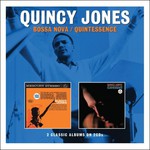
Bossa Nova / Quintessence
 $20.00
Out of Stock
$20.00
Out of Stockadd to cart more by this artist
Quincy Jones
Bossa Nova / Quintessence
[ Not Now Music / 2 CD ]
Release Date: Friday 1 May 2015
"Fabulous introduction to the eclectic works of Quincy Jones" - Shindig Magazine
____
To much of the record-buying public, Quincy Jones is known principally as the producer of Michael Jackson's 'Thriller'. But the wide-ranging musical genius of the man universally known simply as Q has encompassed much more than this.
Quincy Delight Jones was born in 1933 in Chicago. At the age of 12 he played trumpet in a band and, at 18, won a scholarship to the Berklee School of Music in Boston. He left his studies prematurely to tour with bandleader Lionel Hampton, playing trumpet and honing his arranging skills on tour. He received commissions to work with, among others, Sarah Vaughan, Dinah Washington, Count Basie and Duke Ellington.
In 1956, Quincy toured the Middle East and South America as trumpeter and arranger to Dizzy Gillespie. On his return, he signed with ABC-Paramount Records and started his recording career with his own big band. The following year he moved to Paris where he received lessons in composition from classical composer Olivier Messiaen and inspirational teacher Nadia Boulanger (who also taught Aaron Copland and Burt Bacharach, among others). Jones toured with many bands throughout the Fifties, in particular with his own Jones Boys. However, there were eighteen members in the band and, although they delighted audiences and received appreciative reviews, a lack of proper budgeting meant that they split through lack of finance. This taught Jones a valuable lesson. He said:
'I discovered that there was music, and there was the music business. If I were to survive, I would have to learn the difference between the two.'
In 1962 Quincy Jones produced an album of Latin-American-inspired music entitled 'Big Band Bossa Nova'. The instrumentation on the album is deliberately low-key and mellow, consisting of a single trumpet (played not by Jones but by Clark Terry), saxophones, flutes, piano (played by fellow composer Lalo Schifrin), guitar, bass, drums and three percussionists.
The opening track on the album has since become very well known, and it is now impossible to listen to it without hearing the words 'Groovy, baby!' 'Soul Bossa Nova' was the theme tune for the Austin Powers films, although it had seen previous employment by DJ Alan Freeman on his radio shows and as a theme for the 1998 football World Cup. It apparently took Jones just twenty minutes to write and is the only track on the album composed by him. The remaining selections are songs from Broadway musicals (such as Rodgers and Hammerstein's 'On The Street Where You Live') or arrangements of Latin American songs such as the intriguing 'One Note Samba', the melody of which consists of a series of notes at a single pitch in samba rhythm.
If the 'Big Band Bossa Nova' album can be looked on a frothy dessert, then the main course is surely provided by 'Quintessence'. Released in 1961, it has been described as 'the sound of the modern, progressive big band at its pinnacle'. The instrumentation has a harder edge than the '…Bossa Nova' album, with Melba Liston (trombone), Phil Woods (saxophone), Julius Watkins (French horn), bass player Milt Hinton and pianist Patricia Brown on two of the sessions and bassist Buddy Catlett and pianist Bobby Scott on another. Trumpets were played by Freddie Hubbard, Clark Terry, Thad Jones and Snooky Young.
The deep swing and blues in Quincy's originals such as the title track, 'Robot Portrait' and 'For Lena And Lennie' are beautifully warm but tight and punchy. The woodwind tempers the heat provided by the brass just enough to give an easy swing to the rhythmic dialogue. Elsewhere, on Thelonious Monk's 'Straight, No Chaser', the pace is cranked up as far as it will go. Just two minutes 27 seconds in length, the track crams more into its short time frame than other arrangers can manage in a whole album. Benny Golson's 'Little Karen' is, by contrast, laid-back and fluid - but when the brass enters, it does so with a vitality that is irresistible. The genius of 'Quintessence' is that, because of its extreme brevity, there is not a second wasted. Packed with creativity and joy, it is a masterpiece of understatement.
In 1964 Jones became vice-president of Mercury Records, the first Afro-American to be appointed to such a post, and he later wrote some highly influential film scores, notably Walk Don't Run (1966), In The Heat Of The Night (1968) and The Italian Job (1969). In the Seventies he met Michael Jackson when he produced the soundtrack for The Wiz (a version of The Wizard of Oz starring Jackson and Diana Ross) and went on to produce three of the highest-selling albums of all time in 'Off The Wall', 'Thriller' and 'Bad'.
Quincy Jones has always been a prominent social activist and was a close friend of Martin Luther King Jr. He received the John F Kennedy Center Honors in 2001 and the Humanitarian Award at the 2008 BET Awards - fitting tributes to a man who has influenced not only contemporary music but has enriched the lives of millions around the world.
Tracks:
DISC 1 BIG BAND BOSSA NOVA
1. Soul Bossa Nova
2. Boogie Bossa Nova (Aka Boogie Stop Shuffle)
3. Desafinado
4. Manhã De Carnaval (Morning Of The Carnival)
5. Se É Tarde Me Perdoa (Forgive Me If I'm Late)
6. On The Street Where You Live
7. Samba De Uma Nota Só (One Note Samba)
8. Lalo Bossa Nova
9. Serenata
10. Chega De Saudade (No More Blues)
DISC 2 THE QUINTESSENCE
1. The Quintessence
2. Robot Portrait
3. Little Karen
4. Straight No Chaser
5. For Lena And Lennie
6. Hard Sock Dance
7. Invitation
8. The Twitch